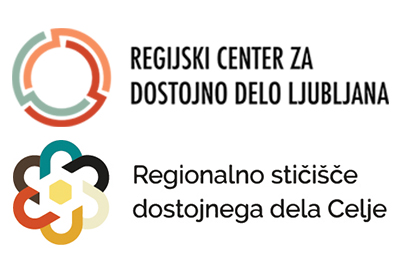In August 2017, the Association of Employers of Slovenia launched two five-year projects for the promotion and implementation of decent work, which were selected by the Ministry of Labor, Family, Social Affairs and Equal Opportunities to co-finance projects Supporting Labor Market Stakeholders. While ZDS in the Cohesion Region of Western Slovenia is the promoter of the project and will, together with the project partners, the e-Student service and the Trade Union of Gorenjska Region to establish the Regional Center for Decent Work Ljubljana, in the Cohesion Region East Slovenia cooperates as a partner, together with the Regional Chamber of Commerce of Celje - the project promoter - and the Slovenian Union of Trade Unions Alternativa to establish the Regional Hub of Decent Work Celje.
The projects “Regional Center for Decent Work Ljubljana (RCDDL)” and “Regional Hub of Decent Work Celje (RSDDC)” are aimed at solving the problem of the negative effects of illegal use of atypical forms of work in both cohesion regions of Slovenia, and promoting the concept of decent work for all citizens, which will have an impact on the reduction in the proportion of labor law offenses in connection with the employment contract
THE PROBLEM
Slovenian social and economic reality is directly linked to fundamental global trends, which are the result of economic and social changes in the postmodern era. New challenges in the labor market are leading to the de-standardization of employment methods and organization of work, and thus the illegal use of atypical forms of work. It is of the utmost importance to identify and raise awareness of the irregularities of such behavior by employers, workers and the general public.
The renewed reform of the labor market in 2013 envisaged the introduction of a single employment contract, which, except in specific cases, would be valid for an indefinite period, but its positive effects towards the set goals were not fully proven effective. In fact, three years later, changes and new structural challenges have emerged in the labor market. The gap between employees who work on the basis of a fixed-term contract or a contract of indefinite duration and those who perform work under other forms of work, whether legal or illegal, has increased. It is therefore important not only to limit labor market measures to reaching as many people as possible, but also to address the issues of substance, thereby ensuring decent work for workers, which enables them economic, social and legal security.
Atypical forms of employment can represent all forms of employment that are not permanent for an indefinite period of time: from fixed-term contracts and part-time contracts, to civil and copyright law (sub-contract, individual entrepreneur) to work through student services. More and more job seekers are looking for jobs outside the traditional employment contract, as these types of jobs are often easier to reach than permanent employment contracts. Increasing the percentage of self-employed and other forms of atypical employment is reducing the number of unemployed, but it does not mean that the labor market situation is improving. The fact is that the current system encourages both employers and individuals to aggressively seek alternative ways of working, so both projects will primarily focus on enhancing activities in the field of labor law prevention and providing appropriate information tools, which will help raise awareness of the illegal use of atypical work forms and to increase awareness of the importance of legal forms of flexible work.
PROJECT ACTIVITIES AND THEIR CONTRIBUTION TO DECENT WORK
Regional hubs of decent work will be set up in Ljubljana and Celje to inform and advise labor market stakeholders on labor rights and obligations and to raise awareness among all labor market stakeholders about the negative and positive impact of the use of atypical forms of work. The hubs will also be aimed at connecting all key players in the labor market and promoting the concept of decent work.
The following activities will be carried out within the regional hubs:
- personal, telephone and electronic counseling for employers, workers, students, the unemployed, job seekers;
- conducting workshops and trainings for all target groups;
- setting up an online platform that will allow anonymous online chat and e-counseling and education in the form of webinars;
- establishing a virtual consultant;
- designing a decent promoter model.
Accordingly, the project partners want to transfer, promote and build on the good practices of the concept of decent work for all citizens and, through various activities and events (workshops, conferences, other events), connect one another.
An integrated approach will contribute to:
- achieving the right balance and respect for legal, economic and social standards at all levels;
- increasing the number of people in the labor market, both active individuals and jobseekers, who will be familiar with labor rights and obligations;
- reducing the proportion of illegal use of atypical forms of work and violations in the area of labor law in connection with the employment contract.
More on projects RCDDL and RSDDC


The project is co-financed by the European Union from the European Social Fund, and the Republic of Slovenia.

